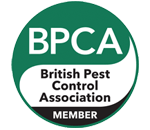Mice infestations can quickly become a serious issue in homes and businesses, leading to property damage, health risks, and contamination. At Total Pest Control, we specialise in safe and effective mice pest control solutions, tailored to remove mice from your property and prevent their return. With our professional team and proven methods, we identify the root of the problem and offer comprehensive treatments to restore your space to a pest-free property.
Discover our blog on How Mice Get in Homes and How To Stop Them for expert mouse control tips.
What are the signs of a Mouse problem?
As Mice are crepuscular (active between dawn and dusk) and nocturnal animals, it is not always easy to physically spot them. There are however a few signs which could indicate that you are suffering from rodent activity that requires effective mice pest control. These can include:
- Mouse Droppings – A single mouse can leave between 50-60 droppings behind per night. These can be scattered across a wide area, but a large concentration could indicate an area of major activity.
- Noises – Despite being relatively small, Mice can be heard in the house when scurrying and scratching around. This is prevalent if your mice infestation is in the loft and can be heard through the ceiling. If you do hear noises, it is far more probable to be the House Mouse, which favours warm conditions.
- Damage – Mice need to continuously gnaw and chew on items as a preventative measure to stop their teeth from over-growing. They are not picky on what materials to use to achieve this, and have been to gnaw on wood, plastics, cables and wires.
- Smell – In concentrated areas, Mice can be distinguishable by an ammonia-like smell. This is similar to Rats, however, and a Total Pest Control technician can help in identifying exactly what pest you have.
Problems associated with Mice
Mice can cause serious issues by spreading diseases like leptospirosis, LCMV, and salmonella, which pose risks to both humans and pets. Additionally, some people experience musophobia, a fear of rodents, leading to stress, anxiety, and depression when mice are present. The below reasons are why mice pest control is essential when you face a mice infestation.
- Leptospirosis – Caused by bacteria called leptospira, this disease in its mildest form can cause flu-like symptoms. It can be transmitted to humans through contaminated water, soil or food. It is important to stress that the more serious form of this disease, Weil’s disease, cannot be transmitted by Mice.
- Lymphocytic choriomeningitis virus (LCMV) – A viral infectious disease that can either be in the form of aseptic meningitis, encephalitis or meningoencephalitis. This could be caught through any exposure to urine, droppings or saliva from the Mouse. Pregnant women are particularly susceptible to catching this.
- Salmonella – Mice often carry the salmonellosis disease, which can be picked up by humans and any household pet through contact with droppings and contaminated food or surfaces. This can cause gastro-enteritis in humans, and could possibly have fatal consequences for pets.
- Musophobia – Some individuals suffer from severe revulsion at the sight of a rodent in their home, business or workplace. This can even lead to depression, stress and other anxiety disorders
How to get rid of Mice?
Quick treatment is essential should you have a mice infestation. The three week gestation period means that even the smallest mouse problem could soon escalate into a serious situation that increases both risk to your health, but also the overall cost to treat your problem.
For effective mice removal, Total Pest Control can offer a secure pest management call out service which provides peace of mind. Our professional mouse pest control solutions include:
Treatment
- A visit guaranteed within 24 hours of your call or enquiry either by phone on 01235 819511 or by email
- A visit by a fully-trained local technician, who has the knowledge and expertise to conduct an in-depth inspection of your problem, offering the best solutions to manage and remedy it as quickly as possible.
- Fully secure, locked bait stations, resulting in them being safe to be used as household pets.
Mouse Proofing Works
- Advice from mice pest control experts on how to prevent mice from returning to your property.
- Effective mouse proofing involves sealing entry points, installing door sweeps, using wire mesh over vents, securely storing food, eliminating nesting sites, repairing damaged screens, and maintaining cleanliness to reduce the risk of mice infestations.
Get In Touch Today
Do you have a troubling mice infestation which requires professional attention? Trust Total Pest Control for our effective mice pest control solutions. Our team of qualified mice control experts will ensure effective mice removal, alongside implementing measure to stop them returning.
Contact us today for a free quotation.






